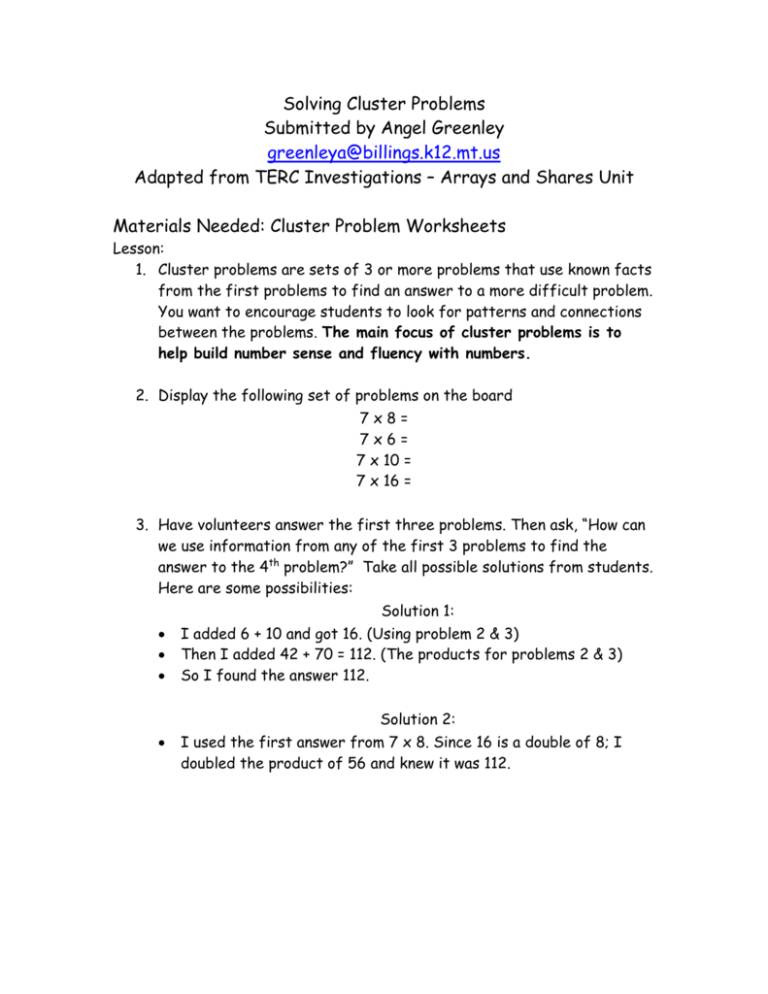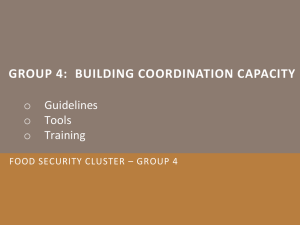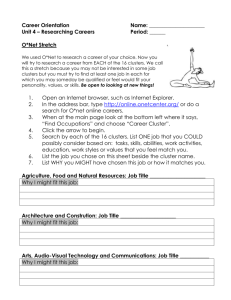Investigation 3: Session 1
advertisement

Solving Cluster Problems Submitted by Angel Greenley greenleya@billings.k12.mt.us Adapted from TERC Investigations – Arrays and Shares Unit Materials Needed: Cluster Problem Worksheets Lesson: 1. Cluster problems are sets of 3 or more problems that use known facts from the first problems to find an answer to a more difficult problem. You want to encourage students to look for patterns and connections between the problems. The main focus of cluster problems is to help build number sense and fluency with numbers. 2. Display the following set of problems on the board 7x8= 7x6= 7 x 10 = 7 x 16 = 3. Have volunteers answer the first three problems. Then ask, “How can we use information from any of the first 3 problems to find the answer to the 4th problem?” Take all possible solutions from students. Here are some possibilities: Solution 1: I added 6 + 10 and got 16. (Using problem 2 & 3) Then I added 42 + 70 = 112. (The products for problems 2 & 3) So I found the answer 112. Solution 2: I used the first answer from 7 x 8. Since 16 is a double of 8; I doubled the product of 56 and knew it was 112. 4. Display the 2nd set of cluster problems. 4X5 2 x 15 4 x 10 4 x 15 Since some of these are not basic facts (2 x 15), you may have students explain how they arrived at that answer. Possible solutions for finding 4 x 15 include: Solution 1: I used 4 x 5 and 4 x 10. Since 5 + 10 equals 15, I can add the products of these two problems. So 4 x 15 equals 20 + 40 = 60. Solution 2: I knew that 4 is double of 2. Since 2 x 15 = 30; then I know that 4 x 15 is double that, so it is 60. 5. Continue using sample problems until students are comfortable with the many different strategies. These can be used as a regular lesson and then followed up as a morning opener each day to keep the strategies fresh. Multiplication Cluster Problems Solve each cluster of problems. Look for ways the problems in each cluster are related. 10 x 123 20 x 123 2 x 123 22 x 123 10 x 18 5 x 18 50 x 18 2 x 18 20 x 18 40 x 18 45 x 18 47 x 18 400 x 9 500 x 9 90 x 9 8x9 2x9 498 x 9 2 x 72 10 x 72 5 x 72 20 x 72 200 x 72 210 x 72 215 x 72 Multiplication Cluster Problems Solve each cluster of problems. Look for ways the problems in each cluster are related. 20 x 4 25 x 4 2x4 23 x 4 3 x 25 10 x 25 12 x 25 13 x 25 5 x 50 10 x 50 7 x 50 17 x 50 3x5 200 x 5 233 x 10 233 x 5 4 x 25 10 x 25 40 x 25 50 x 25 6 x 25 46 x 25 500 x 4 1000 x 4 2500 x 4 2507 x 4 Multiplication Cluster Problems Solve each cluster of problems. Look for ways the problems in each cluster are related. 8 x 25 30 x 25 40 x 25 38 x 25 4 x 40 70 x 40 75 x 40 74 x 40 25 x 4 200 x 4 250 x 4 275 x 4 277 x 4 25 x 5 200 x 5 2000 x 5 2025 x 5 Challenging Multiplication Cluster Problems Solve each cluster of problems. Look for ways the problems in each cluster are related. 7 x 40 25 x 40 250 x 40 275 x 40 282 x 40 3 x 50 20 x 50 200 x 50 197 x 50 0.5 x 50 2.5 x 5 25 x 5 2.5 x 50 12 x 24 25 x 12 0.5 x 24 12.5 x 24 Cluster Problems Make an estimate for the first problem in each cluster. Then solve the problems in the cluster. Estimate for 34 x 50 _________________________________ 3 x 50 10 x 50 34 x 25 30 x 50 34 x 50 Estimate for 62 x 23 ____________________________________ 60 x 20 62 x 10 62 x 3 62 x 23 Estimate for 36 x 43 ______________________________________ 10 x 43 30 x 40 5 x 43 10 x 36 36 x 43 Estimate for 37 x 27 ____________________________________ 10 x 27 30 x 20 37 x 2 40 x 27 37 x 27 Cluster Problems Make an estimate for the first problem in each cluster. Then solve the problems in the cluster. Estimate for 36 x 20 _________________________________ 6 x 20 3 x 20 30 x 20 36 x 20 Estimate for 26 x 30 ____________________________________ 6x3 20 x 3 26 x 3 26 x 30 Estimate for 43 x 35 ______________________________________ 30 x 3 40 x 5 40 x 30 43 x 35 Estimate for 29 x 15 ____________________________________ 10 x 15 9 x 15 20 x 15 29 x 15





